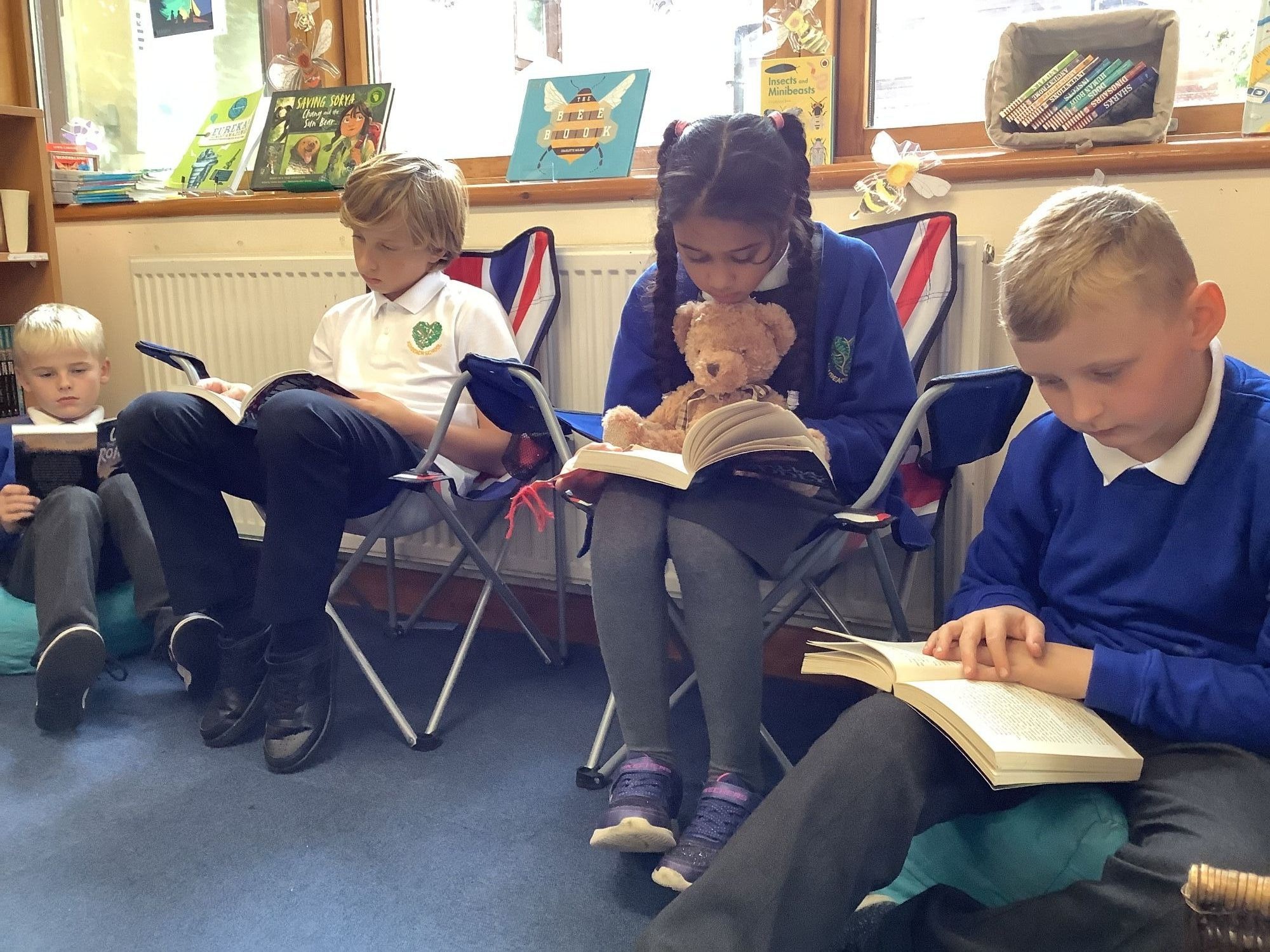Reading
 Reading at Ashbeach School
Reading at Ashbeach School
The vision for Reading at our school is primarily that all children are equipped with the skills to enable them to read fluently and with a good understanding of what they read so that they can enjoy the benefits that reading has to offer. We aim to enable children to have the skills to read across the curriculum to gain and develop knowledge and understanding of all subjects.
We aim to foster a love of reading and an appreciation of rich and varied literature.
We prioritise early reading at Ashbeach School. The aim is that by the end of Ks1 children have a firm foundation of skills to enable them to make further progress with their reading so that they end Y6 being able to read fluently and with confidence ready for their secondary education.
The school ensures that reading is a high priority. This begins at the start of Reception. Daily phonics sessions in the early years and key stage 1 are taught by skilled adults. Reading books are well matched to the sounds that pupils know. Most pupils learn to read fluently by the end of Year 1. Pupils who struggle to read are identified quickly. They receive extra support to help them catch up and have improved their reading fluency by the end of Year 2. This helps prepare them for the next stages in their learning. (Ofsted, 2024)
Reading in EYFS and KS1
We teach phonics with fidelity to the Little Wandle Scheme. 
Thanks to an effective transition process, we are able to begin teaching phonics in the second week in EYFS. Learning in daily whole class phonics is embedded through daily ‘keep up’ incidental practice. Rigorous assessment, both formative and summative, allows us to track progress and identify any gaps in learning which are quickly addressed in daily ‘catch up’ sessions.
Children who have fallen behind (ks2) take part in ‘rapid catch up’ sessions designed to plug the gaps in a timely manner, aiming to bring them on track to achieve the reading expectations for their age group.
This pattern continues into year one until the children have secure knowledge of all the phonics phases, allowing them to access a wider range of text.
Guided reading is also taught through Little Wandle in EYFS and Y1. Adult-led sessions take place 3 x a week and is centred around a book matched specifically to the children's stage of phonics. After sessions on context, decoding and comprehension, the children take the book home to read to parents and embed their learning.
In addition to their Little Wandle phonics book, the children are encouraged to take home ‘a book to share’. This is any book chosen by children that they wish to share with their family at home. This book will not necessarily be decodable and is intended to promote reading for pleasure and provide additional opportunities for children to hear stories read aloud to them at home.
Once the children have securely reached phase 5, they move to the same programme as key stage 2.
Children in KS1 have daily story time and daily songs and rhyme sessions.
Year 2 and Key stage 2
As the children begin key stage 2, there is a focus on reading fluency. Children are taught to read at an appropriate pace with intonation and automaticity. This is taught as a whole class and in smaller groups where needed. Children select the book they wish to read independently from a carefully selected variety organised by theme. They are taught to assess that the book matches their ability level using a simple 5- finger system. This allows children to select books they are interested in and will have the ability to read.
The lowest 20% of readers are listened to on a 1:1 basis daily. Children who have still not secured the basic skills will continue to learn to read through the Little Wandle Programme.
Whole class guided reading takes place daily in KS2. We use high quality texts as our class readers. Class text have been pre-selected and ensures quality and a range of genre and representation. Teachers are encouraged to select their own text to compliment this. The whole class gets the opportunity to listen to the teacher read 4 x a week in story time. Extracts from this text are then used as a stimulus for half of the guided reading sessions which teach the objectives set by the national curriculum. The stimuli for the other half of the guided reading sessions are based on non-fiction or other sources of text to ensure the children are familiar with a range of text types based on a variety of topics and contexts. Where possible, the topic covered will link to other areas of the national curriculum to deepen their understanding. To ensure the text chosen meets the age range required, teachers use resources from literacy shed + (comprehension shed).
Reading for Pleasure
Classrooms each have a ‘mini library’ where books are presented to entice the children to read them. Books are organised by genre. Teachers and children are encouraged to make recommendations to one another. 20 minutes a week children talk about text and make recommendations in a ‘book talk’ session.
Children are given multiple opportunities to read throughout the week; however, a dedicated 20 minute session is protected for independent reading.
Children have access to the library at lunch, daily, where an experienced member of staff is available to help children select books.
On the playground, a reading shed is available for children to share books and read together in comfort or play reading-based games.
Every month, the council library van visits the school and some children have the opportunity to borrow books with their library card.
A communal space is dedicated to promoting books and the theme is changed regularly.
We regularly celebrate reading by holding open days where we invite the parents in to learn about how we teach reading or just a chance to share a book with their children.
